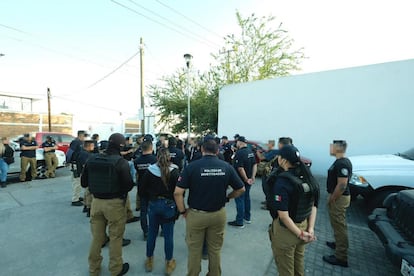Marijuana, blood and phone scams: New clues in the case of seven workers who disappeared from a Mexican call center
A week later, there is no trace of the missing employees. Authorities suggest the establishment was a front for a network with ties to organized crime that swindled foreigners, especially elderly U.S. citizens


Possible traces of blood, marijuana, and blackboards with the names of foreign-sounding individuals as well as profit targets. This is part of what the Jalisco Prosecutor’s Office found in two searches conducted this past weekend in two different locations of that Mexican state: a call center in Zapopan, where seven young workers went missing last Monday, and a property that the investigation led to. The first complaint came on Saturday, May 20: Carlos Benjamín García Cuevas had disappeared. Within days, the brothers Iztel Abigail and Carlos David Valladolid were also reported missing. The tragedy continued to expand, as did the questions: Arturo Robles, Jesús Alfredo Salazar, Mayra Karina and Jorge Velázquez had also disappeared. They were all around 30 years old and they all worked at a call center that is the focus of investigators’ suspicions. Authorities say the premises worked as a cover for a network with ties to organized crime that carried out telephone fraud against foreigners.
This past weekend, agents from the Jalisco Prosecutor’s Office searched the call center located on Víctor Hugo street, in the Jardines Vallarta neighborhood of Zapopan, where several of the missing workers were last seen. The establishment was empty, but inside they found some marijuana leaves, a piece of cloth and a mop with reddish stains, which they suspect are probably blood. They also found boards with the names of foreigners written on them, as well as notes about membership and economic goals. The place did not have a valid operating license. According to the Prosecutor’s Office, any activity that was being carried out inside was “outside the framework of legality.”
The owner of the premises is an individual named Francisco Javier who rented the property in November 2022, more or less at the same time as some of the employees began to work there. The operation was aided by a lawyer named César Javier, who has been linked to two other fraud investigations in 2014 and 2015. Authorities also found a car belonging to one of the victims in the vicinity of the alleged company, and they obtained testimony from several people who said they saw several armed individuals deploying in the area “with all the characteristics of organized crime,” said the Jalisco prosecutor, Luis Joaquín Méndez.
The investigation led agents to another location on Johannes Brahms street, also in Zapopan. The search carried out there on May 27 produced lists of names and contact information, more blackboards with foreign names, a bag of marijuana, hard drives, computers without the CPU, and severed cables everywhere. The Prosecutor’s Office hopes to come up with more clues, but so far the missing workers have not been found. Over the weekend, more than 100 agents participated in tracking efforts in other major population areas in the state: Guadalajara, Zapopan, Tlajomulco de Zúñiga, El Salto and Huaxtla.
The prosecution’s line of investigation is supported, according to the newspaper Milenio, by the findings of the U.S. Treasury Department, which issued a statement on April 27 establishing a link between a network of fraudulent call center businesses and the Jalisco New Generation Cartel (CJNG), which allegedly uses them to cover up fraud schemes targeting older U.S. citizens. The relatives of the missing workers described the latter as working for a company that sells vacation packages by telephone.
“CJNG’s deep involvement in timeshare fraud in the Puerto Vallarta area and elsewhere, which often targets elder U.S. citizens and can defraud victims of their life savings, is an important revenue stream supporting the group’s overall criminal enterprise,” said the Treasury Department statement. The U.S. government wants to stop these practices and has designated and sanctioned 19 companies that are allegedly part of the cartel’s network. Several individuals were also named, chief among them Eduardo Pardo Espino, described as a fugitive from a U.S. drug trafficking charge and financial operator for CJNG based in Puerto Vallarta, one of the quintessential tourist enclaves in Mexico.
The disappearances have brought to the fore a problem that is gripping Jalisco, the state with the highest number of disappearances and missing persons in Mexico. Desperate relatives of the missing call center workers demonstrated last Friday, claiming that the Prosecutor’s Office was not giving them any information more than a week after their disappearance. Governor Enrique Alfaro has backed the theory that the call center was nothing more than a cover-up for “operations of another nature.”
Sign up for our weekly newsletter to get more English-language news coverage from EL PAÍS USA Edition
Tu suscripción se está usando en otro dispositivo
¿Quieres añadir otro usuario a tu suscripción?
Si continúas leyendo en este dispositivo, no se podrá leer en el otro.
FlechaTu suscripción se está usando en otro dispositivo y solo puedes acceder a EL PAÍS desde un dispositivo a la vez.
Si quieres compartir tu cuenta, cambia tu suscripción a la modalidad Premium, así podrás añadir otro usuario. Cada uno accederá con su propia cuenta de email, lo que os permitirá personalizar vuestra experiencia en EL PAÍS.
¿Tienes una suscripción de empresa? Accede aquí para contratar más cuentas.
En el caso de no saber quién está usando tu cuenta, te recomendamos cambiar tu contraseña aquí.
Si decides continuar compartiendo tu cuenta, este mensaje se mostrará en tu dispositivo y en el de la otra persona que está usando tu cuenta de forma indefinida, afectando a tu experiencia de lectura. Puedes consultar aquí los términos y condiciones de la suscripción digital.








































